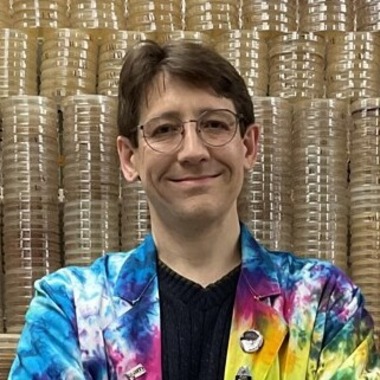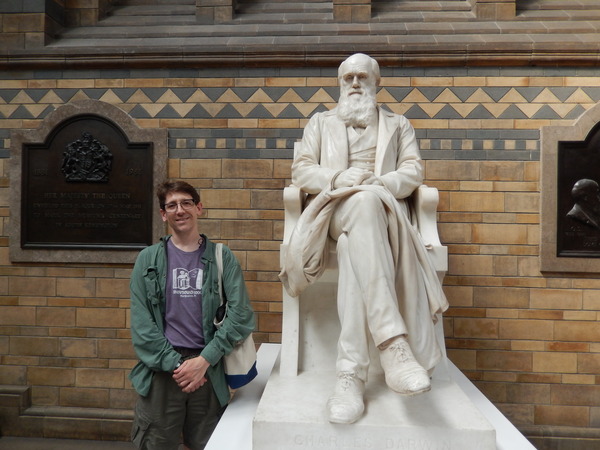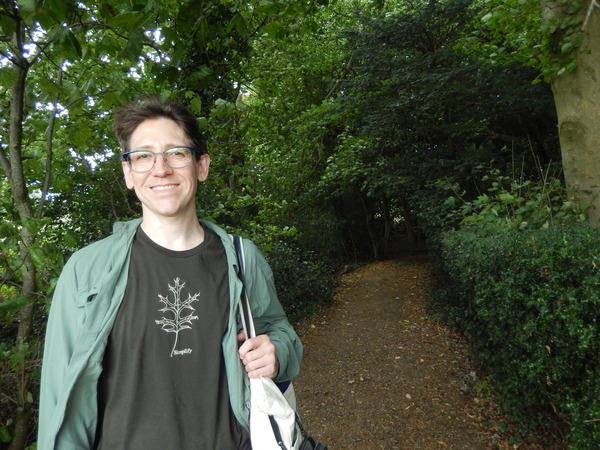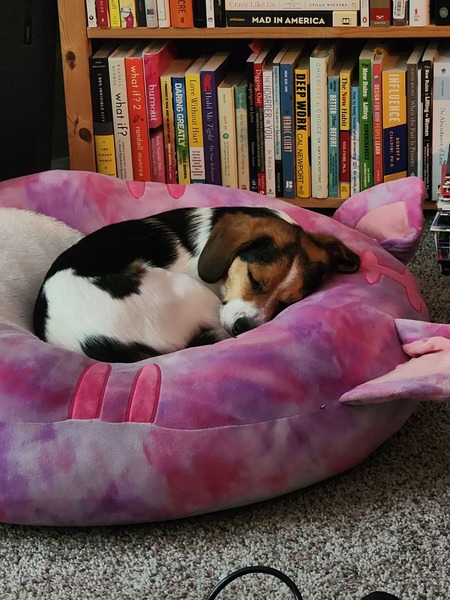Dr. Zack Blount
Zack Blount, Ph.D., is an Assistant Professor and the Director of Graduate Education Innovation in MGI. He sat down with MGI Communications Manager Debbie Walton for a Micro Biography interview. Here’s a lightly edited transcript of their conversation.

Q: How and when did you become interested in the field(s) of microbiology, genetics, and immunology?
A: Goodness, that, that is a hard question.
It's probably something that it's best to say came together over time. I grew up in the middle of the country and having nature all around kind of called one to an interest in biology.
When I was little, my mom was getting a master's in biology education, and she would study for her tests by singing songs about the material, so I was getting genetics into my brain from a very early age through my mom, and that generated some interest in genetics. I remember being interested in it pretty early on.
Because of that, I read Brave New World far earlier than I probably should have. In middle school, I developed an interest in evolution, and then I had a really great AP biology teacher named Lynn Pugh who cultivated more interest in biology, even though at the time I wanted to be a physicist.
So, I started college wanting to study physics, but I found out I couldn't do math, which led me to go back to biology. During my second year at Georgia Tech, I took Introduction to Microbiology. It was like this entry into a whole world that I had no idea about because I really hadn't gotten much micro before, and I was just enraptured by it.
So, I knew whatever I would go on to do, I wanted to study microbiology in addition to everything else, and I wanted to try to find something that would roll all the different interests together.
Q: Were there any particular people or events who influenced your journey?
A: Well, definitely my mom, as I mentioned, and Ms. Pugh. And my intro micro professor, his name was Thomas Tornabene, was a very eccentric person, and that probably aided in the interest in microbiology. Beyond that, meeting Rich Lenski here definitely helped solidify a lot of things.
As far as events go, I had an unintentional gap year after college. I didn't get into grad school the first time, which was fine. I wasn't entirely certain in the direction I wanted to go, and that summer during the gap year I worked at a used bookstore, read a lot of philosophy, and thought a lot.
I went on a walkabout driving trip out west and camped along the way with the idea of “I’m going to figure out what I want to study and do with my life.” I knew I wanted to go on and do more education, but I didn't know what.
That trip ended up being very influential in deciding my direction, because I remember at one point being under an incredibly starry sky in Texas and just thinking, okay, I want to understand something that speaks to biology everywhere, and at the time I thought, “Okay, I want to study astrobiology.”
I didn't end up going in that direction ultimately, but that is what led me to MGI and coming to MSU.
Q: How did you come to be part of this department?
A: So, I was interested in going on to study astrobiology and getting into microbiology in an astrobiology context, and I knew at the time that my research background wasn't strong enough, so I got a master's at University of Cincinnati studying hyperthermophilic archaea from boiling sulfur springs in places like Yellowstone and Iceland.
Then, I started looking for PhD programs where there was astrobiology research, and MSU was one of them. I interviewed at three programs, and there was just something about this department. People were so nice and welcoming, and the atmosphere was very good and nurturing. I just felt at ease here, and so I ended up accepting an offer to come here for the PhD program. Then, obviously, I liked it because I haven't really left.
Q: What's your main research area right now, and why is it important?
A: So, my main research area right now, as it has been since I started in the Lenski lab, is the role of historical contingency, these chance factors in history and in evolution, and how that plays a role in the origin and consequences of novel traits leading to speciation and so on.

I study this one particular population in the long-term experiment* where a novel metabolic ability evolved, and I'm studying the consequences of that and using that as a model system to go off in other related directions. [*Dr. Blount is referring to the Long-Term Evolution Experiment begun by Dr. Rich Lenski in 1988. You can read more here: https://lenski.mmg.msu.edu/ecoli/index.html]
The work that I'm starting to do now is looking at using this model system to start doing evolutionary counterfactuals and setting up what-if scenarios to see how evolution would have gone in this population had other events happened.
Counterfactuals are "what if" scenarios from history, like "What if Archduke Franz Ferdinand had not been assassinated in 1914," "What if Bobbie Kennedy had not died in 1968," or "What if the Soviets had landed on the moon first?" Evolutionary counterfactuals are the same sort of thing, so "What if the asteroid had not hit Earth 66 million years ago?"
We can do a version of that in the lab with experimental evolution because we keep frozen samples of evolving populations. So, we can go into a sample from a time point, restart the population – but with a small change, like deleting a gene – and then evolve them again to see how they evolve similarly or differently from how the population originally did. So, it's like stopping Franz Ferdinand's assassination and then seeing if World War I would have happened, or if it would have happened differently.
It's important because life has a particular history on this planet, and I'm very interested in the question of how the particularities and weirdnesses in that history have influenced where life has gone and how evolution has gone.
It's also important in trying to come to some understanding of how much we can predict about evolution, which is valuable for understanding pathogen evolution and what might happen with biowarfare agents should they ever be released. It also speaks to what we can predict about life that might be elsewhere.
Now, if evolution is very predictable, then we can look around us on Earth and think, okay, wherever life is in the universe, it's going to look much like this. Whereas, if there is a lot of contingency and a lot of potential to go in different directions depending on how history goes, life out there could be utterly different than what we think of here. So, there are a lot of important aspects to the work that I do, even though it's a little esoteric and a little difficult to explain sometimes.
Q: How do you see your research evolving?
A: So, I already spoke to these counterfactual experiments that I'd like to do, but I just took a new position overseeing the development of the R3 curriculum for graduate education.
The R3 program is about taking certain things that have been implicit, where we informally train scientists in how to think like scientists and be scientists and reason through thorny problems on the nature of science, and formalizing them.
I'm overseeing the development and implementation of classes that teach students the nature of science, the practice of science, how we actually know things scientifically, how to avoid falling into scientific errors, how to think through the ethics of science and get at the three R's behind the R3: rigor, responsibility, and reproducibility. Do science that's rigorous, that is responsible to society, and is reproducible, and try to get us out of this reproducibility crisis that we're in in science.
I just took this position starting this year. So, I'm transitioning from being mainly focused on research as a research professor to education. How my research is going to evolve is going to be determined by how I find ways of balancing the ambits that I'm in.
If education ends up requiring a huge amount of time, which it's going to, then it may be that I'm more focused on educational research and demonstrating the efficacy of what I'm doing with only a minor component being what I do in the lab. It may end up being that my scientific contributions are going to be through giving ideas to collaborators who will then pursue these questions or in doing more philosophical position papers on these phenomena that I'm interested in.
So, my work is evolving, but it's difficult to predict exactly how it's going to evolve, which is appropriate.
Q: What types of activities are you involved in outside of research?

A: I do a lot of outdoor stuff. I camp a lot. I hike every weekend. I spend as much time out of doors as I can. I do a little bit of art. If people go to my website, I have calligraphy up that I do.
Beyond that, I read a lot. I read a lot of science fiction, nonfiction, and a huge amount of history. I desperately love history, which is one of the reasons why I'm interested in historical contingency and evolution. It really brings a lot together for me. And I read a lot of politics, and when I'm camping, I read mystery novels because they read quickly and they're fun in the forest.
Aside from that, I just I do activities with my spouse and our dog. In fact, our dog Napoleon is probably the one who determines what I do most outside of work.


We gave him that name as a joke because he was small, spunky and kind of French because he's part Papillon. It turned out to be very appropriate. One way he deals with his anxiety is he barks his head off at anything that's strange. But his mode of aggression is if he manages to get off leash and he's upset at the presence of a person, he'll run at them and then run around barking and then run away. It's perfect.
Q: Is there anything else you'd like to share?
A: So, I was thinking about this, and I don't know if it's exactly what's envisioned, but I think that it's appropriate for the whole gist of the conversation, and I think that it's a valuable perspective for grad students who would be reading this, which is: I never saw my path going the way it has.
Like so many others, I came to grad school with this notion of my path would be very standard, very straight. I would get a PhD and I'd go on and get a faculty position and be a PI with a lab and all of that. And it hasn't worked out that way.
I never thought that I would end up in a position where I'd be education focused. I didn't expect to be researching what I research. But I'm happy with the way it's gone. And I think that it reflects something that grad students need to keep in mind, which is we don't all follow the same path. And paths are not always straight. They go at their own pace. They twist and they turn. And you have to accept that and follow what seems right. And if you do that and are confident in your step as you go along that path, you can end up, like I have, in a place that isn't exactly where you expect it, but which is fulfilling and allows you to make a real contribution on many levels.
I taught one section of the 491 capstone class last spring, and one thing I do when I teach is I hand out note cards so that people can ask questions on them rather than having to raise their hands. It leads to some very interesting questions and people are willing to ask questions they wouldn't otherwise.
I made it clear that I'll answer any questions, which led to, even though I'm a microbiologist, answering questions about black holes and stuff. But also, “How did I end up where I am?” There were also questions like, “Is it okay that I don't know what I want to do?” It turned out everyone in the class had that question, but most of them were afraid to ask.
We tend to give this sense to kids that they have to know. They're not allowed to wonder about that. That it's not okay to be anxious about the path you're going to be on eventually. That you have to know exactly all the steps you're going to take. And it's not the case.
And I told them that I didn't know what I wanted to be when I grew up, but in some ways I still don't. And it's okay. And part of recognizing that it's okay to not know is recognizing that it's okay when you have an instinct that draws you a certain way or that you are finding fulfilling. It's okay to pursue that.
If you had this notion when you were five that you wanted to go to medical school, and you get to be 22 and you're not so sure, it's okay to not go to medical school.